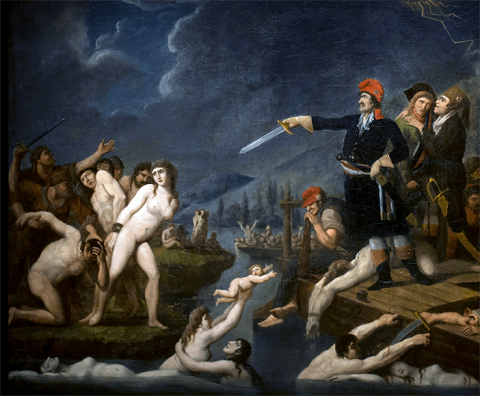
Jean-Claude Benaben was the Jacobin commissioner for Maine-et-Loire. In 1793, Benaben visited western France and oversaw action against rebels in the Vendée. His report, filed at the end of 1793, describes some of the brutal recriminations carried out by Republican soldiers:
“I was witness to all the horror a town taken by storm can present Soldiers spread out into the houses and having taken the wives and daughters of the rebels who had not had time to flee, took them into the squares or the streets, where they were crowded together and butchered on the spot: shot, bayoneted or slashed with swords. Ultimately the fury of the soldiers was such that the general-in-chief, fearing that they would, in the end, turn on patriots, found no other means to end the carnage than to sound the retreat.
If beauty and youth were given so little respect during this siege, even less was paid to the position of great ladies, whose heaving bodies were dragged in the mud. The hussars [mounted soldiers], who never lose their bearings on these occasions, took the richest prizes…
The whole route to Mans was covered with the bodies of the rebels… Local peasants had made a general retreat into the woods and into the farms and massacred more than we were capable of killing ourselves. Four or five leagues [10 to 15 miles] from Mans, I saw on the side of the road about 100 bodies, completely naked, piled one on top of the other, more or less like pigs ready to be salted… We contented ourselves with taking all the men and women who were not immediately claimed and only killed those who could not walk since we did not have carriages in which to transport them…
More than 1,200 rebels were shot at Savenay – but according to the information that I have since received, it seems that more than 2,000 were shot. They call that ‘sending to hospital’.
An entirely different method is used here to get rid of this nasty lot. We put these scoundrels in boats which are then sunk to the bottom. We call that ‘sending to the water tower’. In truth, if the rebels have sometimes complained about dying of hunger, they at least cannot complain about dying of thirst. Today, we made about 1,200 drink. I do not know who came up with this kind of punishment but it is much more rapid than the guillotine, which now appears destined to cut off the heads of nobles, priests and all those who, according to the rank they once held, had great influence over the masses.”
